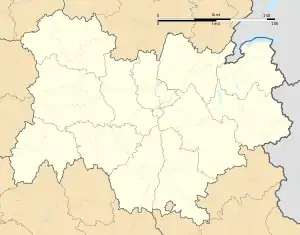Saint-Gérard-le-Puy | |
|---|---|
 The chateau and other buildings in Saint-Gérard-le-Puy | |
Location of Saint-Gérard-le-Puy | |
 Saint-Gérard-le-Puy  Saint-Gérard-le-Puy | |
| Coordinates: 46°15′31″N 3°30′46″E / 46.2586°N 3.5128°E | |
| Country | France |
| Region | Auvergne-Rhône-Alpes |
| Department | Allier |
| Arrondissement | Vichy |
| Canton | Saint-Pourçain-sur-Sioule |
| Government | |
| • Mayor (2020–2026) | Xavier Cadoret[1] |
| Area 1 | 19.55 km2 (7.55 sq mi) |
| Population | 950 |
| • Density | 49/km2 (130/sq mi) |
| Time zone | UTC+01:00 (CET) |
| • Summer (DST) | UTC+02:00 (CEST) |
| INSEE/Postal code | 03235 /03150 |
| Elevation | 268–359 m (879–1,178 ft) (avg. 325 m or 1,066 ft) |
| 1 French Land Register data, which excludes lakes, ponds, glaciers > 1 km2 (0.386 sq mi or 247 acres) and river estuaries. | |
Saint-Gérard-le-Puy (French pronunciation: [sɛ̃ ʒeʁɑ̃ lə pɥi]; Occitan: Sant Geran del Puèi) is a commune in the Allier department in Auvergne-Rhône-Alpes in central France.
Geography
Much of the local rock is limestone common in the Auvergne, known as indusial, because of the cases, or indusiae, of the larvæ of Phryganea (resembling caddis-flies), which have been encrusted, as they lay, by hard travertine (a white or light-coloured concretionary limestone, usually hard and semi-crystalline, deposited from water holding lime in solution).
The area is rich in fossils, notably birds from the Miocene era. See, for example, Cheneval J (1984), Les oiseaux aquatiques (Gaviiformes à Ansériformes) du gisement aquitanien de Saint-Gérard-le-Puy (Allier} (The aquatic birds (Galliformes to Anseriformes) of the aquitanian deposits of Saint-Gérard-le-Puy (Allier}.
History
A Roman road runs by the town. It was a fortified village in the Middle Ages, deriving strategic importance from its location on the route from Moulins to Lyon.
The town was a stop on the pilgrimage to Santiago de Compostela - a local cross marking the way is shown at .
It belonged to the seigneurie of Montluçon at the beginning of the 13th century but when the le Bourbonnais (part of the Massif Central essentially co-terminous with the modern Allier) became a Duchy in 1327 it passed into of the hands of the Bourbons.
During the French Revolution it was known as Puy-Redan. In 1832, Saint-Etienne-de-Ciernat and Saint-Etienne-du-Bas were joined to the commune and, in 1833, Saint-Allyre-de-Valence followed.
Administration
List of successive mayors
- 1991–current: Xavier Cadoret (before his naturalization: Karim Kadouri) (mayor since 1991, re-elected in 1995 (77%), in 2001 (84%), in 2008, in 2014 and in 2020[1]).
Population
| Year | Pop. | ±% |
|---|---|---|
| 1962 | 3,330 | — |
| 1968 | 1,143 | −65.7% |
| 1975 | 1,121 | −1.9% |
| 1982 | 1,018 | −9.2% |
| 1990 | 1,064 | +4.5% |
| 1999 | 1,029 | −3.3% |
| 2009 | 993 | −3.5% |
| 2013 | 1,023 | +3.0% |
| Source: INSEE (1968–2013) | ||
Its inhabitants are known as Gérandass.
Sights
- The 11th-century Romanesque Church of St Julien[3]
- Château of Saint-Gérard: The manor is 15th-century;
- Manor of Gondailly is 15th-century with 19th-century reconstruction;
- A dodecahedral washhouse is under restoration;
- The James Joyce Museum is located in a room adjoining the town library.
The Joyce connection
In December 1939 James Joyce, his wife, Nora, and son, Giorgio, made an extended visit to the town to see Giorgio's son, Stephen, a pupil at the bilingual school there.
In February 1940 they were visited by Samuel Beckett.
After Easter, they moved for a few months to Vichy, some 20 km (12 mi) away, to see their friend Valéry Larbaud. Personal problems, and the imminent German occupation, persuaded them to move to their final port of call, neutral Switzerland, where they arrived on 14 December 1940. A year later, Joyce died in Zurich. His obituary published in Time can be read online .
The memory of Joyce has been celebrated for many years in Saint-Gerard, in particular with "le Jour d'Ulysse ."
Personalities
- James Joyce (b. Dublin, Ireland 2 February 1882) - (d. Zurich, Switzerland 13 January 1941).
- Alphonse Milne-Edwards 13 October 1836 - 21 April 1900.
See also
References
- 1 2 "Répertoire national des élus: les maires" (in French). data.gouv.fr, Plateforme ouverte des données publiques françaises. 13 September 2022.
- ↑ "Populations légales 2021". The National Institute of Statistics and Economic Studies. 28 December 2023.
- ↑ Base Mérimée: PA00093273, Ministère français de la Culture. (in French)
External links
(All sites in French, unless otherwise indicated)